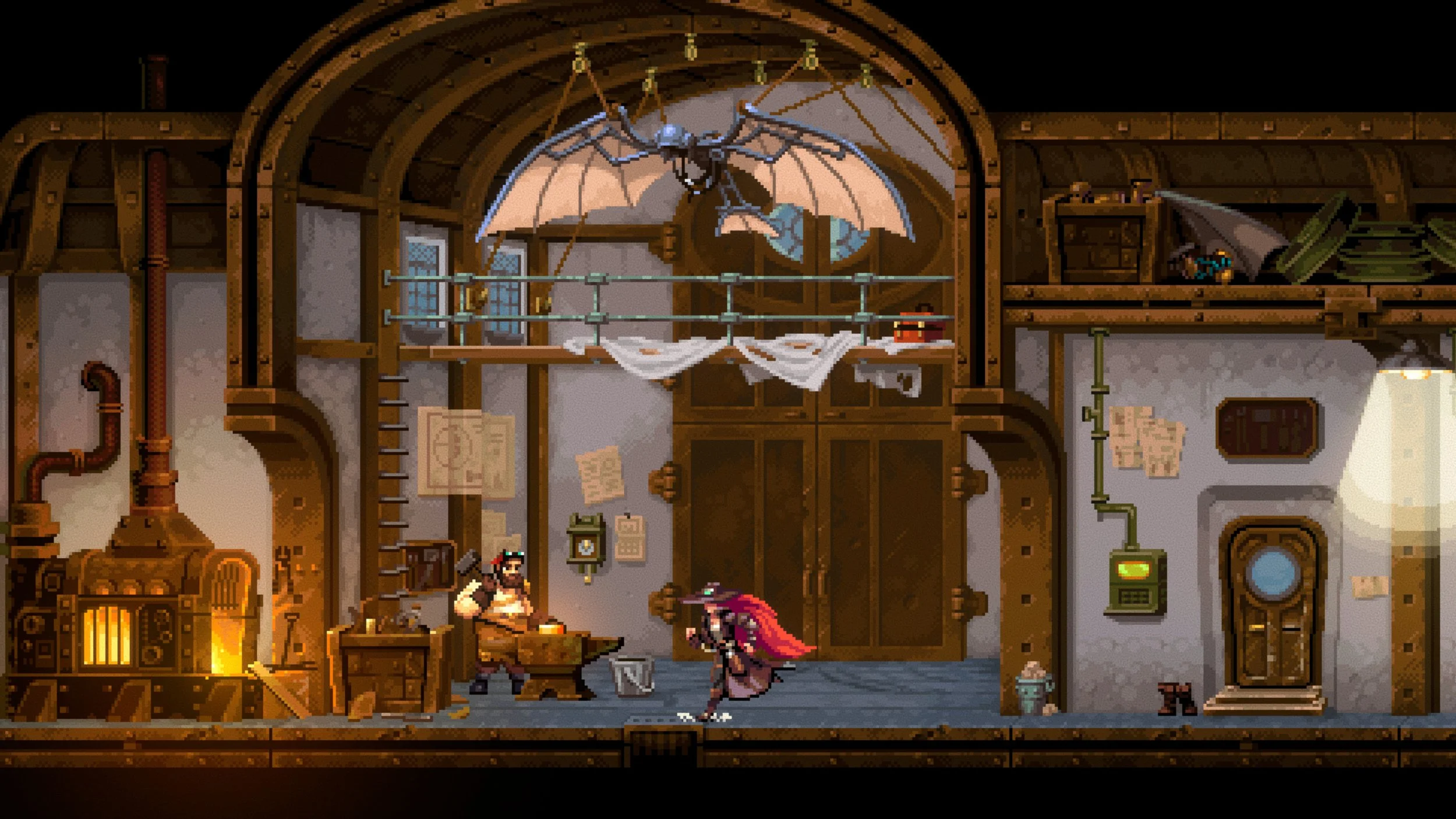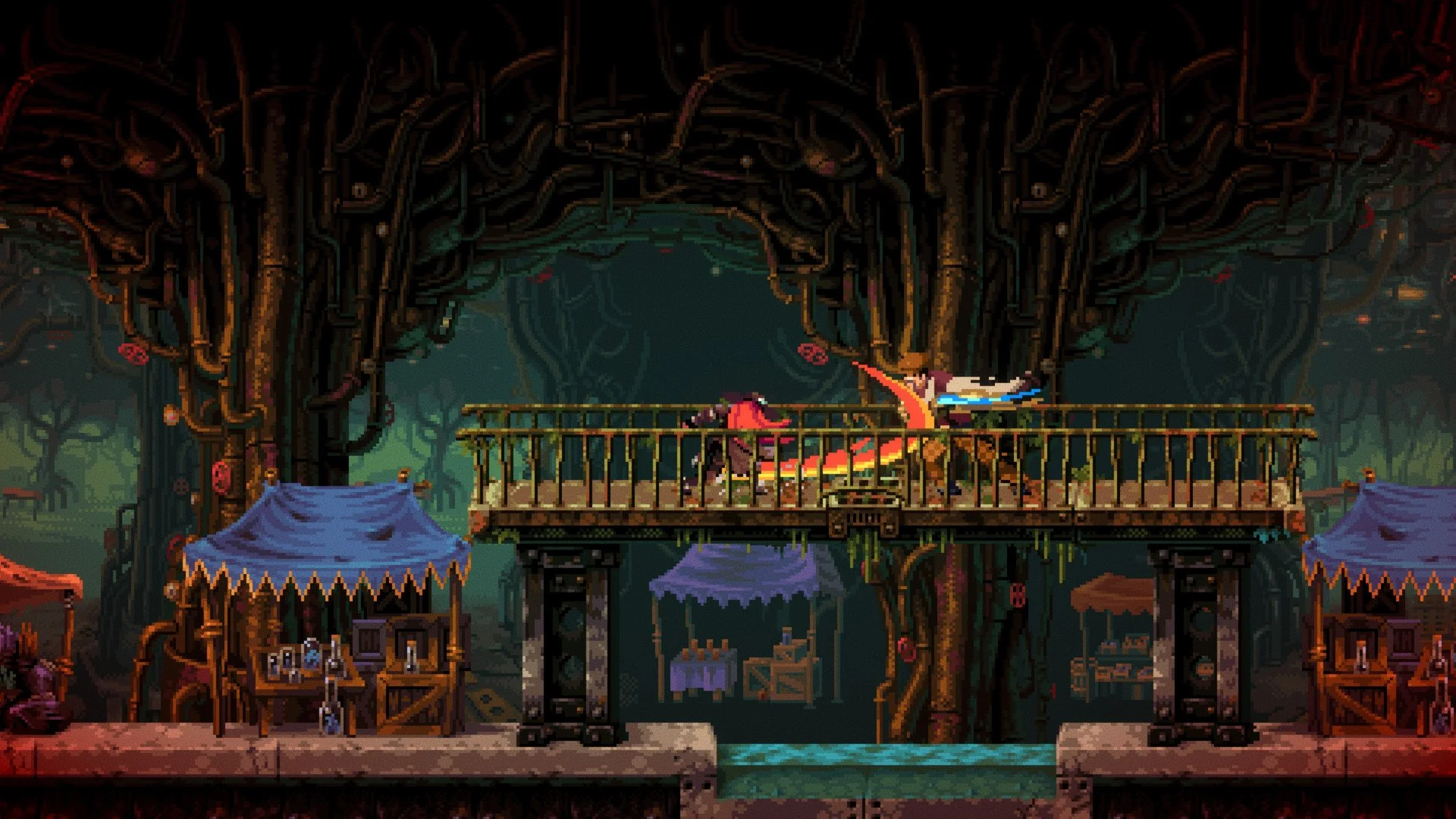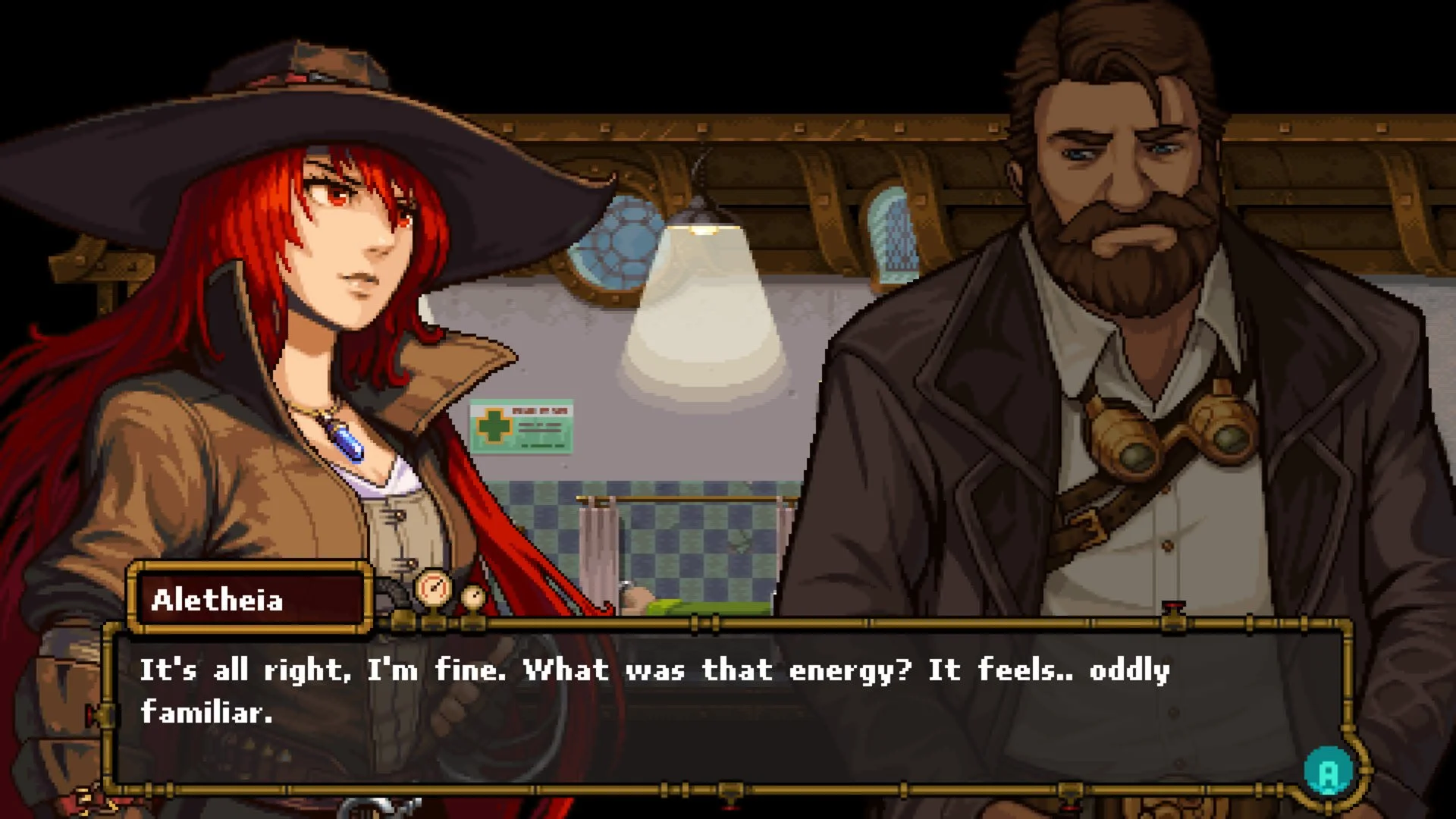You’ve got the touch, you’ve got the power.
After wrapping credits and cheering on the game’s ending, I found it hard to believe that this was a studio’s first game. Developer Metamorphosis Games has literally come out of nowhere to create one of the best games I’ve played this year. It’s not perfect as the game has some balance issues to address, but the story, presentation, and gameplay is top rate, placing it right up there with the genre’s best.
When I first looked up Gestalt: Steam and Cinder, It was yet another entry in the Metroidvania genre that has been a hot spot for indie studios of late. While it can convey some of the genre’s traits, it relies on the tropes of that type of game to a very light degree. You’ll have a few key cards to track down to earn some of the game’s best equipment, but there are rarely moments where you unlock massive chunks of the environment because of a new power or skill. While new traversal abilities do get you to new places, I never felt it was the driving force of what the team was aiming for.
Gestalt: Steam and Cinder is a very story-focused entry in the genre. There are several moments where you’ll leave the main heroine's side and suddenly be far away across the map deep in conversations between many of the game’s other characters. From allies to enemies, you’ll be treated to several moments that build up the story and the connections between the cast. And while a game could buckle under the weight of a bad story dominating your play time, especially given this adventure is roughly around the 7 to 8-hour mark, I found the story to keep me deeply engaged, right through to the game’s epic final moments. To say I am excited for a sequel is under-selling it.
The story revolves around the consequences of power. You play as Aletheia, a mercenary called a “Soldner” that does the odd job for the right price. This world is one that is on the brink of extinction, the remnants of a battle that saw the demons of the underworld invade the surface. While humanity won out in the end, by tapping into the very power they were fighting against, those who survived wanted more. As you explore old ruins and locations well beyond the city’s walls, you discover more about the war and what actually happened. While I have been somewhat invested in the narrative of several other Metroidvania titles, what Metamorphosis Games has crafted here is downright engaging. There are plenty of twists and turns that feel earned as the game does what it can to give those moments time to breathe. It's a simple story, sure, but given the length of the game, it feels perfectly tuned as nothing overstays its welcome.
Aletheia begins the story trying to find an assistant to a friend of hers. A simple tracking job that suddenly becomes more than she was ready for. And as she begins to dig deeper into the world around her, she starts to put the pieces together to understand her role in the conflict that is on the rise. While the war has been silent for years, something is brewing to bring that conflict back, threatening to destroy the last city of mankind once and for all. The game and its supporting characters do well to bounce off of Aletheia and her plight, to give her just enough answers and yet still ensure there are plenty of questions left to ask. While you’ll certainly put the pieces together long before she will, it’s not a knock at the storytelling, but that Aletheia is simply burdened with so much more to deal with that us.
Where Gestalt stands out for me within the genre is the limited map that feels big enough to support the game but not small enough where you'll be retracing your steps through large portions of it over and over again. A few of the previous Metroidvania games I've played have had maps that bordered on excessive, making any sort of substantial exploration to feel like you were barely making a dent. The map is filled with numerous secrets, chests, and items that you can use to craft new gear or purchase new items. The systems put in place provide options without feeling overwhelming.
The game is also smart about providing a narrative reason for your progression. Most games in the genre rely on you to figure out where to go whereas Gestalt has a firmer grip on the where and why. While that may deter most players or purists of the genre, I welcomed it, given the game didn't look to waste my time, an issue I somewhat had with Noreya: The Gold Project. While the point of a Metroidvania is to unlock new areas with key abilities, there are usually hints or a design to the world that illustrates that you shouldn’t be there yet. I spent hours in Noreya lost and unsure where to go, pushing deep into sections I wasn’t meant to be at yet. Gestalt organically moves you around and you never truly feel lost, ensuring my time is spent playing the game and less wondering what it wanted from me.
Moving around the map is fun, easy, and paced rather well. However, I do have one minor criticism. In most Metroidvania games, rooms are usually a series of horizontal or vertical shapes that make up hallways, platforms, or vertical drops, visually shown on the map. Here, rooms are undefined in the map, making the pathing within them a mystery, even when fully mapped out. This never caused any significant frustration, but I do wish that once those areas had been explored that the lined pathing would have been drawn on the map.
Aletheia will gain abilities like a double jump, and an air dash, adding to her wall-bouncing that you have right from the jump, making it then possible to reach the out of reach platforms that would pop up from time to time. Again, this doesn't greatly open up the map in the typical ways one would expect, but it does make the traversal greatly expanded upon and feels remarkably solid to control. The fact that this is the team's first game is mind-blowing. Every jump or placed platform felt great, well-defined, and I never once fought against the controls or the design as everything felt superb to handle.
As you gain new abilities, they open new areas of the skill tree to then sink points into. You'll earn these skill points in a variety of ways and the skill tree grants a series of perks and buffs to said skills and will also grant you additional health, stamina, and more. It's a solid system that isn't revolutionary, but it works well here without feeling over-designed or convoluted. Even adding trinkets to boost your skills, healing flasks, or crafting new armor is simple enough and explained very well. And since each of these things are largely tired to some of the supporting characters, it allows the world and cast to expand just a bit to make the world a little bit bigger.
Gestalt’s combat flows extremely well. From new skills and combo attacks, you’ll be slicing and dicing and rolling out of the way as long as your stamina remains plentiful. You’ll soon gain access to a gun whose charges are refilled by your attacks, much in the way where characters with mana in other games can see that recharge as you strike physically at your foe. The skill tree will allow you to continue to add to your capabilities with more ammo slots and being able to deal more damage. It’s a simple toolset, but it gets the job done and lets you master what you have available.
Attacking and defeating enemies is simple. They will have both a break bar and a health bar. Some enemies can take enough damage quickly and simply be destroyed with little effort. Some have shields or other means to block your damage, but most enemies can be defeated by chipping away at their break damage and then stunning them, especially as your gun contributes to that, even more so much later on in the game. Again, most of what Gestalt does isn’t terribly original, but it takes pieces of what works and flawlessly implements those ideas here in a package that feels solid and not a hatchet job of mixing bespoke mechanics and hoping they work well together.
I mentioned the balancing issue at the start of the review and frankly, that is the game’s only glaring issue. When you start to get your abilities in order and master what you have, the back half of the game is a breeze. I think with some balance-checks to some of the last few bosses, it would be a perfect mix of challenge, skill, and strategy. A few of the early bosses really gave me something to work for, but the biggest threats the game throws at you are simply too easy, especially the final battle. Not only did I first try it, but I had plenty of health flasks left to keep me going.
Gestalt: Steam and Cinder shines in its simplicity without any of its components feeling watered-down. The story and its lead character shine and work well alongside a great feeling set of attacks and abilities. For this being a studio's first game, it is remarkably polished with superb animations and detail. Make no mistake, this is one gorgeous game that shines with an equally great soundtrack to boot. It may not set the genre on fire, but it is an excellent entry that stands alongside some of the best to ever do it.
Developer - Metamorphosis Games. Publisher - Fireshine Games. Released - July 16th, 2024. Available On - Xbox One, PS4, Nintendo Switch, PC. Rated - (T) - No Descriptors. Platform Reviewed - PC / Steam Deck. Review Access - A review code was provided by the publisher for the purpose of this review.















Jeff is the original founder of Analog Stick Gaming. His favorite games include The Witcher III, the Mass Effect Trilogy, Hi-Fi Rush, Stellar Blade, Hellbade: Senua’s Sacrifice, and the Legend of Heroes series, especially Trails of Cold Steel III & IV.